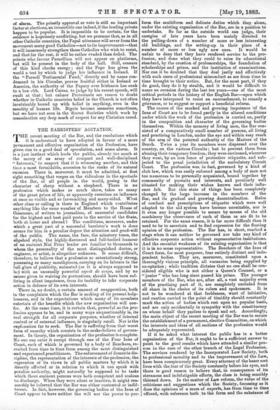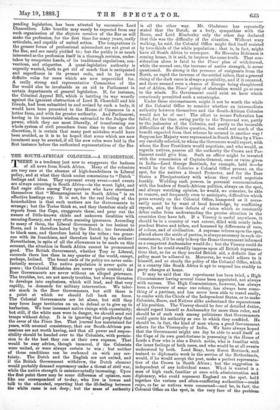THE BARRISTERS' AGITATION.
THE recent meeting of the Bar, and the resolutions which it is understood to have adopted in favour of a more permanent and effective organisation of the Profession, have given rise to a good deal of speculation, and some alarm. It is a just instinct which leads the public, already too much at the mercy of an army of compact and well-disciplined " Interests," to suspect that it is witnessing another, and this time a most formidable, accession to the ranks of its natural enemies. There is, moreover, it must be admitted, at first sight something that verges on the ridiculous in the spectacle of the Bar, of all people in. the world, posing in the character of sheep without a. shepherd. There is no profession which makes so much show, takes so many of the great prizes of life, or apparently exercises an influence at once so visible and so far-reaching and many-sided. Wkat other class or calling is there in England which contributes anything like the same number of Members to the House of Commons, of writers to journalism, of successful candidates for the highest and best paid posts in the service of the State, both at home and abroad.? The conditions, moreover, under which a great part of a successful barrister's work is done secure for him in a peculiar degree the attention and good-will of the public. The name, the face, the minatory tones, the slipshod style, the highly-flavoured and full-bodied humour of an eminent Nisi Prins leader are familiar to thousands to whom the personality of the most distinguished doctor, or engineer, or artist, is altogether unknown. It seems difficult, therefore, to believe that a profession so ostentatiously strong, possessing so many mouthpieces, carrying on its labours in the full glare of publicity, animated (as it is always supposed to be) with an unusually powerful esprit de corps, and by no means given to waiving its pretensions, should have been suf- fering in silent impotence, from its inability to take corporate action in defence of its own interests.
There is, no doubt, a certain amount of exaggeration, both in the complaints which the Bar is making of its present help- lessness, and in the expectations which many of its members entertain of the benefits which the new organisation will con- fer. At the same time, it is certain that, powerful as the pro- fession appears to be, and in many ways unquestionably is, its real strength for all corporate purposes, whether of internal control or of external influence, is singularly small. Nor is the explanation far to seek. The Bar is suffering from that worst form of anarchy which consists in the make-believe of govern- ment. In theory, the organisation of the profession is complete. No one can enter it except through one of the Four Inns of Court, each of which is governed by a body of Benchers, re- cruited from time to time from among the most distinguished and experienced practitioners. The enforcement of domestic dis- cipline, the representation of the interests of the profession, the expression of its views in all public matters by which it is directly affected or in relation to which it can speak with peculiar authority, might naturally be supposed to be tasks which these eminent persons were both competent and zealous to discharge. When they were silent or inactive, it might rea- sonably be inferred that the Bar was either contented or indif- ferent. In fact, however, the governing bodies of the Inns of Court appear to have neither the will nor the power to per-
form the multiform and delicate duties which they alone, under the existing organisation of the Bar, are in a position to undertake. So far as the outside world can judge, their energies of late years have been mainly directed to the pulling-down of a number of more or less interesting old buildings, and the setting-up in their place of a number of more or less ugly new ones. It would be unfair to deny that they have rendered service to the pro- fession, and done what they could to raise its educational standard, by the creation of professorships, the foundation of scholarships and prizes, and the institution of examinations. Nor can it be doubted that they deal justly and effectively with such cases of professional misconduct as are from time to time brought to their notice. Bnt, for the most part, if they do good, they do it by stealth, and it would be difficult to name an occasion during the last ten years—one of the most critical periods in the history of the English Bar—upon which they have interposed to resist an encroachment, to remedy a grievance, or to suggest or support a beneficial reform.
The causes of the marked and growing impotence of the Inns of Court are to be found partly in the altered conditions under which the work of the profession is carried on, partly in the composition and character of the governing bodies themselves. Within the memory of living men, the Bar con- sisted of a comparatively small number of persons, all living and practising in London, under the eye and within easy reach of the an of the paternal authority of the Masters of the Bench. Twice a year its members were dispersed over the country, on the various Circuits ; but to prevent them from abusing their temporary freedom, they were environed, wherever they went, by an iron fence of protective etiquette, and sub- jected to the penal jurisdiction of the ambulatory Circuit Court. The profession was, in fact, governed by a kind of club law, which was easily enforced among a body of men not too numerous to be personally acquainted, bound together by community of pursuits and interests, and peculiarly well situated for making their wishes known and their influ- ence felt. But this state of things has been completely changed by the large increase in the numbers of the Bar, and its gradual and growing decentralisation. Rules of conduct and prescriptions of etiquette which were well adapted to the old system have become unsuitable, nor is it even any longer possible to secure by means of the old machinery the observance of such of them as are fit to be retained. For the same reason, it is far more difficult than it used to be to ascertain and to find expression for the floating opinion of the profession. The Bar has, in short, reached a stage when it can neither be governed nor take any kind of effective corporate action without representative institutions. And the essential weakness of its existing organisation is that it is in no sense representative. The Benchers of the Inns of Court form, for most purposes, four entirely distinct and inde- pendent bodies. They are, moreover, constituted upon a thoroughly vicious principle, all vacancies being supplied by co-optation ; while tradition dictates that no one shall be con- sidered eligible who is not either a Queen's Counsel, or a "junior " who has long since passed his prime. The younger members of the Bar, who are, after all, a vast majority even of the practising part of it, are completely excluded from all share in the choice of its rulers and spokesmen. It is not to be wondered at that feebleness, want of initiative, and caution carried to the point of timidity should constantly mark the action of bodies which rest upon no popular basis, and are only accidentally in sympathy with the constituency on whose behalf they profess to speak and act. Accordingly, the main object of the recent meeting of the Bar was to secure the establishment of a permanent, elective Committee, on which the interests and ideas of all sections of the profession would be adequately represented.
If it be asked what interest the public has in a better organisation of the Bar, it ought to be a sufficient answer to point to the good results which have attended a similar pro- cess in the case of the other branch of the Legal Profession. The services rendered by the Incorporated Law Society, both to professional morality and to the improvement of the Law, have been conspicuously great. Every attorney of the baser sort lives with the fear of the Society constantly before his eyes, and there is good reason to believe that, in consequence of its strenuous and indefatigable efforts, the class is being sensibly thinned down. In the matter of Law reform, the value of the criticisms and suggestions which the Society, focussing as it does the opinions of a mass of expel-Vs, has from time to time offered, with reference both to the form and the substance of
pending legislation, has been attested by successive Lord Chancellors. Like benefits may surely be expected from any such organisation of the disjecta membra of the Bar as will make the profession, for the first time for many years; really articulate, and capable of united action. The temptations to the grosser forms of professional misconduct are not great at the Bar, and are rarely yielded to ; but the public is as much interested as the profession itself in a thorough revision, under- taken by competent hands, of its traditional regulations, con- 'ventions, and etiquettes. A quasi-legislative authority is urgently wanted, both to get rid of much that is antiquated and superfluous in its present code, and to lay down definite rules for cases which are now unprovided for. A really strong and representative Committee of the Bar would also be invaluable as an aid to Parliament in certain departments of general legislation. If, for instance, the Criminal Appeal Bill, which is battling its way wearily against the ignorant obstruction of Lord R. Churchill and his friends, had been submitted to and revised by such a body, it would have been presented to the House of Ciimmons in a better form, and with far greater authority. And Parliament, having in its inscrutable wisdom entrusted to the Judges the power, which they use most liberally, of transforming our whole system of civil procedure from time to time at their discretion, it is certain that many past mistakes would have been avoided, as it is to be hoped that some which are now imminent may be averted, if all the new rules were laid in the first instance before the authorised representatives of the Bar.



































 Previous page
Previous page